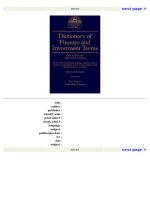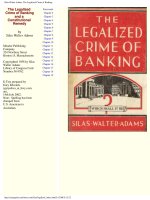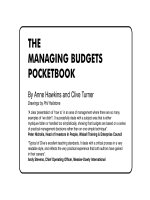Insider GuideKiller Investment Banking Resumes 2nd phần 1 ppsx
Bạn đang xem bản rút gọn của tài liệu. Xem và tải ngay bản đầy đủ của tài liệu tại đây (158.38 KB, 11 trang )
Insider Guide
Killer Investment
Banking Resumes!
2nd Edition
Helping you make smarter career decisions.
WetFeet, Inc.
The Folger Building
101 Howard Street
Suite 300
San Francisco, CA 94105
Phone: (415) 284-7900 or 1-800-926-4JOB
Fax: (415) 284-7910
Website: www.WetFeet.com
Killer Investment Banking Resumes!
ISBN: 1-58207-431-3
Photocopying Is Prohibited
Copyright 2004 WetFeet, Inc. All rights reserved. This publication is protected by
the copyright laws of the United States of America. No copying in any form is
permitted. It may not be reproduced, distributed, stored in a retrieval system, or
transmitted in any form or by any means, in part or in whole, without the express
written permission of WetFeet, Inc.
Table of Contents
Investment Banking Resumes at a Glance . . . . . . . . . . . . . . . . . . . . . . . . . . . . . . . . 1
Overview . . . . . . . . . . . . . . . . . . . . . . . . . . . . . . . . . . . . . . . . . . . . . . . . . . . . . . . . . . 3
The Bottom Line . . . . . . . . . . . . . . . . . . . . . . . . . . . . . . . . . . . . . . . . . . . . . . . . . . . . 5
Firm’s Eye View. . . . . . . . . . . . . . . . . . . . . . . . . . . . . . . . . . . . . . . . . . . . . . . . . . . . . 7
Anatomy of a Resume . . . . . . . . . . . . . . . . . . . . . . . . . . . . . . . . . . . . . . . . . . . . . . . 13
Preparing to Write . . . . . . . . . . . . . . . . . . . . . . . . . . . . . . . . . . . . . . . . . . . . . . . . . . 27
Basic Resume Don’ts and Dos. . . . . . . . . . . . . . . . . . . . . . . . . . . . . . . . . . . . . . . . . 35
Resumes Reviewed. . . . . . . . . . . . . . . . . . . . . . . . . . . . . . . . . . . . . . . . . . . . . . . . . . 41
Cover Letters Reviewed . . . . . . . . . . . . . . . . . . . . . . . . . . . . . . . . . . . . . . . . . . . . . . 83
Getting Your Foot in the Door . . . . . . . . . . . . . . . . . . . . . . . . . . . . . . . . . . . . . . . . 89
Following Up . . . . . . . . . . . . . . . . . . . . . . . . . . . . . . . . . . . . . . . . . . . . . . . . . . . . . . 93
Interview Prep . . . . . . . . . . . . . . . . . . . . . . . . . . . . . . . . . . . . . . . . . . . . . . . . . . . . . 97
Next Steps . . . . . . . . . . . . . . . . . . . . . . . . . . . . . . . . . . . . . . . . . . . . . . . . . . . . . . . . 99
Investment Banking Resumes
at a Glance
The Resume’s Raison d’Etre
• 30 seconds or less to get you to the interview room—or not
• Guide for subsequent discussion in your interview
• Will NOT get you a job
Cover Letters
• Do not play a major role
• Can do more harm than good
Anatomy of the Resume
• Content: education, experience, other
• Format: clean, clear, conservative
• Don’ts: career objective, colored paper, lies
Big Four Characteristics Sought by Banking
1. Quantitative/analytical ability
2. Drive for results
3. Communication skills
4. Team player mentality
1
Big Four Characteristics Sought by Sales and Trading
1. Negotiation skills
2. Intellect
3. Communication skills/relationship building
4. Power of persuasion
Telling Your Story
Think about things you’ve done that demonstrate the Big Four characteristics—
it doesn’t have to have been in an investment banking context.
2
Overview
You’re dying to get an interview with Goldman, Morgan Stanley, or Merrill. The
resume submission deadline is only days away. You know that hundreds of your
classmates are vying for a spot on the same crowded interview schedules. How
will your resume stand out among the crowd? You know there’s no way you’ll be
able to add another extracurricular presidency to your list of “Other Activities”
by next week. Even you can’t read your resume for more than 10 seconds without
your eyes rolling into the back of your head. Will you have enough points to bid
for a spot on all of those schedules? Argh!
Take a deep breath. We’re going to help you get some of the interviews with-
out having to bid all of those points. With the market again showing signs of
life, hiring numbers at banks are healthy. Of course, it goes without saying that
competition is tough. Don’t expect recruiters to compromise their quest for the
brightest and best. And only those who can show in 30 seconds or less that
they are worth a second look will get called for an interview. Yes, that’s right:
30 seconds. That’s the most time any resume reviewer will spend on the initial
review of your resume. That means you need to do the best possible job of
showcasing your skills and capabilities in a powerfully presented resume. Iden-
tifying and presenting your quantitative/analytical skills, your drive for results,
and your teamwork abilities in a format that’s easy to read and easy to digest
will improve your chances of getting into the interview room. After that, it’s up
to you. (Well, not entirely. For help in your investment banking interviews, turn
to WetFeet’s Beat the Street and Beat the Street II Insider Guides.)
This guide is designed to help you do the best possible job of presenting your
qualifications for a career in either banking (corporate finance or mergers and
3
acquisitions) or sales and trading (capital markets). Although it won’t land you a
job at a prestigious firm—there’s a lot more to getting a job offer than sending
in a killer resume—it should give you insight into how the resume review process
works and what firms are seeking. It is designed to help college and graduate
students (or anyone else pondering a career in investment banking) present them-
selves in the best possible light to recruiters, resume readers, and interviewers
from the top firms in the United States.
We interviewed insiders from some of the industry’s elite firms (including Credit
Suisse First Boston, Lehman, UBS, and Merrill Lynch) to find out exactly what
they look for in resumes and cover letters. Although there was some variation
between companies, the comments were remarkably consistent: Resume content is
key, but packaging also plays an important role for investment banks. This guide
will show you how to get a handle on both as you prepare to write your resume.
We start by looking at how firms review resumes (and cover letters). We continue
with a description of the standard investment banking resume and suggestions
about structure and format, after which we tell you how to frame your experi-
ences and education to appeal to the resume reviewer. Finally, we review real
resumes and give suggestions for improvement. Are you ready to begin? Let’s
dive in!
4
The Bottom Line
Remember this: Your resume will not get you an investment banking job. How-
ever, your resume is essential to getting your foot in the door of a top firm and
putting your candidacy up for serious consideration.
At best, resume readers spend 30 seconds reviewing a resume the first time. In
30 seconds, an excellent resume conveys who you are, what you’re capable of,
and how you have used your abilities to accomplish results. It indicates that you
know yourself well and have a firm grasp of what you bring to the table. Or it
doesn’t. Although insiders tell us that “there isn’t one right answer” to the ques-
tion of how to create a good resume (good news for most of us!), they say the
best resumes are concise, results-oriented, and very clearly presented. The correct
structure can make you a more likely interview target and can even help you sail
more smoothly through the interview process. In our conversations with insiders
and reviews of schools’ resume books, we found that a lot of aspiring investment
bankers don’t understand how to successfully structure their resumes. This guide
will help you get ahead of them in line.
Note: In this guide, we use investment banking as an umbrella term. For our pur-
poses, it includes corporate finance, mergers and acquisitions, debt and equity
sales and trading. You may want to read our Insider Guide to Careers in Investment
Banking for in-depth descriptions of each area.
5
Firm’s-Eye View
How Resumes Are Used in the I-Banking Recruiting Process
Before you can write a killer resume, you need to know what happens to it after
it leaves your hands. Our investment banking insiders say that your resume and
cover letter play an important but limited role in the selection and evaluation
process.
Most firms’ recruiting teams consist of members who are almost always based
in the firms’ headquarters who then team up with colleagues in the appropriate
regional offices. Recruiting teams are usually made up of bankers from several
levels (ranging from undergrad hires to MDs) in addition to a recruiting coordina-
tor or manager from human resources. At the larger firms, most team members
will be alums of your school. At least one of the team members will probably
be a recent graduate of your school. Including team members with personal
knowledge of the target schools helps the recruiting teams distinguish between
real and inflated points on a resume and make informed appraisals of your
credentials.
Your resume will likely be read by at least two team members who are appointed to
review independently submitted resumes and resume books from target schools.
As one insider says, “We’re looking for a reason to ding them.”
The next step at many firms is for the recruiting team to discuss the top candi-
dates and decide who will receive interview invites. In these sessions, the initial
reviewer might be asked to describe the candidate, tell his or her “story,” and
explain what is compelling about the candidate. In some cases, the team captain
7
MD will do a final resume review and make interview decisions, either after the
group discussion or in lieu of it.
Remember, team members responsible for recruiting are usually busy juggling
several deals—namely their real jobs. They tend to review hundreds of resumes
at a time and have very little time to spend on each one. Knowing this will help
you understand just how forgettable any single resume can be—and just how
compelling yours must be to stand out.
From the firms’ point of view, the resume’s primary purpose is to help the
resume reviewers determine which candidates merit interviews. A well-executed
resume will increase your chances of getting an interview, but it won’t get you a
job offer. Additionally, your resume will often serve as the basis for an ongoing
evaluation of your candidacy. Each person who interviews you will probably
have a copy of your resume and often a copy of the comments of those who
have already interviewed you. Your interviewer will use your resume (and any
comments) to identify areas to be explored during the interview. Weaknesses or
holes will be probed, strengths will be questioned, and anything that seems
suspect will definitely be tested.
Each firm has its own strategy for navigating the resume flow—you’ll want to do
your homework on their respective businesses, cultures, and staffing approaches
to get a sense of their priorities. Within each organization, however, there are
obvious “breeds” of resume reviewer. Based on our research, we’ve grouped
them as three different species: general scanners, spike seekers, and idealists.
You won’t know which type will pick up your resume. However, as you figure
out how to present your skills, it’s useful to know how various reviewers sort
through their stacks.
8
General Scanners
General scanners have a broad list of attributes in mind and spend a minimal
amount of time matching resumes to their criteria. Usually, they start by doing
a quick scan, looking for the obvious scoop on the person: Did he go to a top
school? Has she worked for good companies? What functional knowledge does
he have? It’s best if this information is prominent and comes immediately to
the eye. If they like what they see, then they’ll read through the entire resume.
This approach is fairly typical of the way an investment banking team member
reads resumes.
Spike Seekers
Spike seekers love highlights. They’re looking for the one thing that will make
this person stand out. Several reviewers have told us that they need to be able to
tell a compelling story about a candidate during resume review sessions. Often
the story will be about how one or two very strong and unique traits that come
through loud and clear on the resume.
Idealists
Some reviewers have an ideal in mind before they start reading, and they look
for how well a resume measures up against it. For example, they look for elements
of the “Big Four” characteristics: analytical skills, academics (3.8 GPA or above
and mention of honors), and a team-type activity such as sports or community
involvement. One insider says, “I look for basic smarts, a team player with leader-
ship skills. The captain of the lacrosse team with a high GPA.”
Other idealists have a preference for one thing they’d like to see on a resume,
based on their own experience as well as their on observations of how past hires
have performed. These individuals are the most difficult to please, because they
each look for different things.
9









